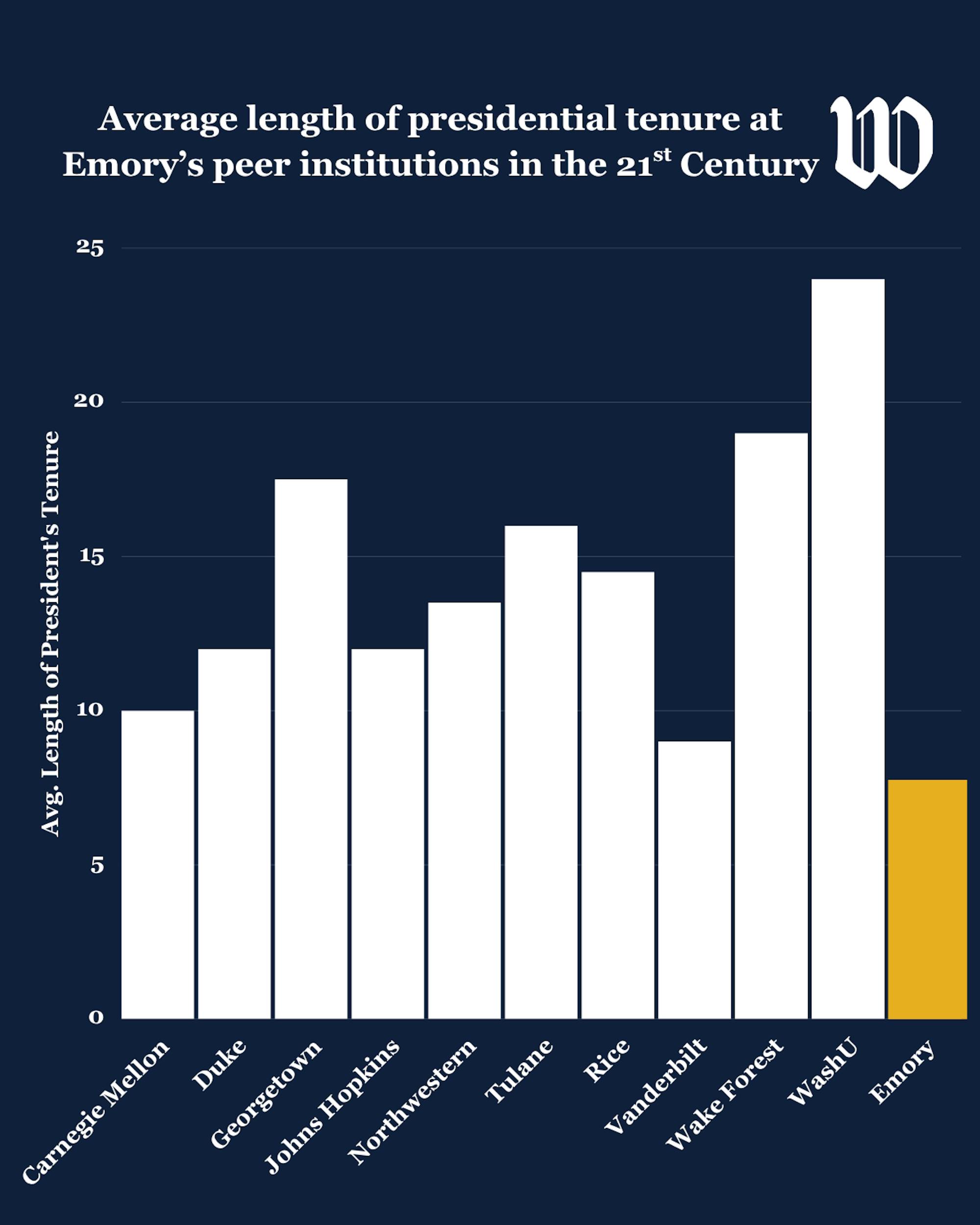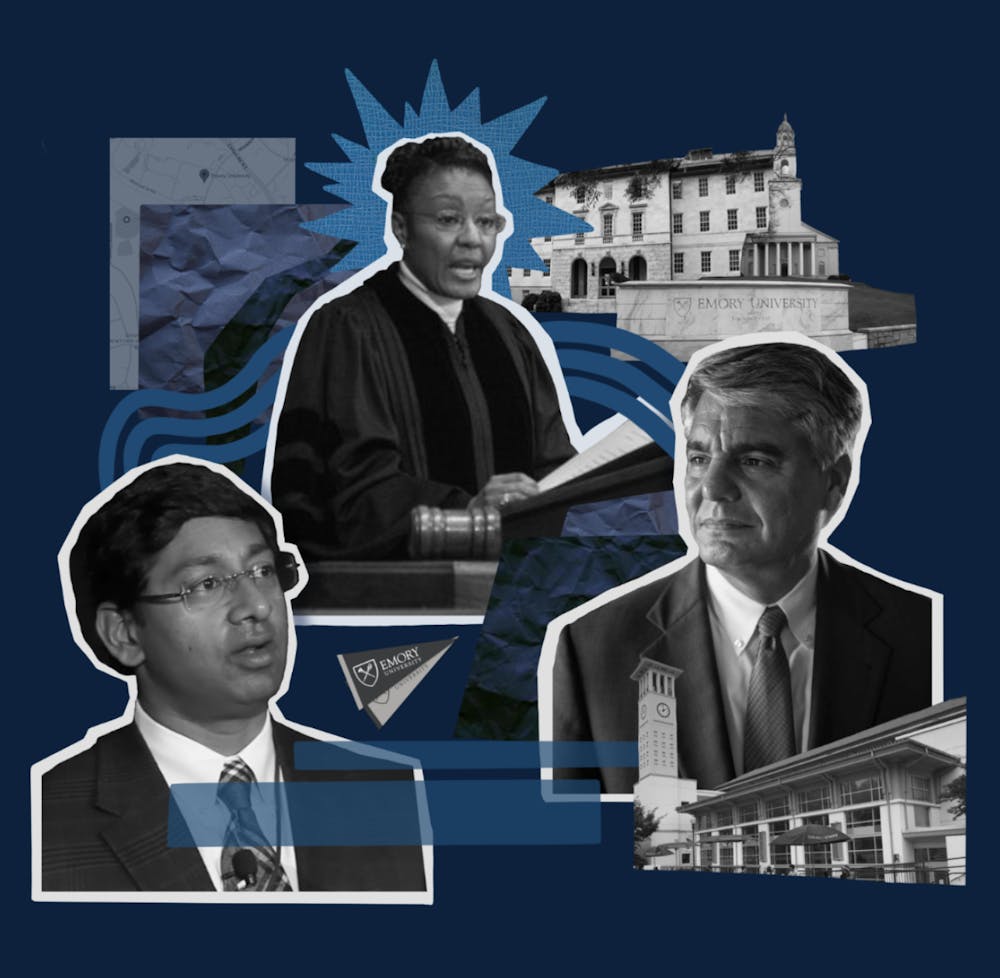Administrative turnover has become the standard at Emory University, and with the departure of University President Gregory Fenves the institution will begin the search for its fifth president since 2000. In September, Fenves will step down as president and take on the role of chancellor, last held by Emory Healthcare CEO Emeritus Michael Johns from 2007 to 2012. During Fenves’ tenure, Emory leaders have shuffled in and out of their positions, with the outgoing president replacing eight of nine college deans during his five-year term.
Between 10 of Emory’s peer institutions, there has been an average of 2.7 presidents since 2000. Emory stands alone among the 10 institutions in having more than three different leaders since the turn of the century. Once its new president is named, Emory will have had five. Additionally, the University has a far lower average tenure in its top role among permanent officeholders since 2000, at 7.75 years compared to 14.75 years at peer institutions. This number includes leaders whose terms began before 2000 but ended after. The Emory Wheel grouped these institutions based on their private university status and closeness in rank to Emory in the U.S. News and World Report 2024 ranking.

On top of Fenves’ departure, Emory continues to search for a replacement provost due to Ravi Bellamkonda, who left Emory in late 2024 to become provost at The Ohio State University. On March 27, Emory announced that it would extend the search for a new provost into the summer after initially expecting to replace Bellamkonda by the end of the spring semester.
During Emory’s last search for a leader in 2020, COVID-19 forced much of the University to work and learn remotely. Now, U.S. President Donald Trump’s policies aim to reshape higher education through broad reductions in federal funding, and Emory, along with other institutions, has trimmed costs and implemented hiring freezes. This evolving political environment will pose continual challenges for Emory’s next president, as well as for Fenves in his new position as chancellor.
Fenves takes on a new role
Universities around the world use the role of chancellor differently. For example, Vanderbilt University’s (Tenn.) chancellor serves in a role equivalent to Emory’s president. Most state institutions have chancellors who oversee all of their state’s public universities. For example, the University System of Georgia, which includes the University of Georgia and the Georgia Institute of Technology, has a chancellor responsible for strategically managing the university system’s future in addition to presidents who oversee individual campuses.
Most private universities do not have chancellors, instead calling their top position president.
Throughout the University’s history, the role of chancellor has meant different things, according to Emory University Historian Emeritus Gary Hauk. He wrote in an email to the Wheel that the first time Emory used the title of chancellor was for its “chief officer” and 10th president, Warren Candler. The next four times that Emory named a chancellor, the appointees were either a former president or a high-level administrator attempting to retire but being persuaded to stay with the University as a “senior statesman,” according to Hauk.
Former Emory College of Arts and Sciences Dean Robert Paul told the Wheel that in the past, the role of chancellor at Emory has been “ceremonial.” He added that previously, the role has been a high-level advisor to the Board of Trustees and an ambassador for the University.
“It doesn’t really alter the actual running of the university,” Paul said. “Still the president and the people around the president and the deans and, of course, the provost, who make the key decisions.”
Southern Methodist University (Texas) Department of Education Policy and Leadership Professor Michael Harris, who studies university administrations, speculated to The Chronicle of Higher Education that Fenves’ new role may be a way to change its leadership without making national headlines.
“This feels like a way to make a change in leadership without coming right out and saying: ‘We’re making a change in leadership,’” Harris said.
The university-wide press release about Fenves’ new role highlighted the “period of unprecedented change” that higher education is experiencing under Trump’s administration.
“Amidst the backdrop of a challenging moment for higher education, Fenves and the Board of Trustees have explored a potential refocusing of his role,” the announcement read.
Given the unprecedented national political environment surrounding colleges in the United States, Paul said that if he were still on the University’s leadership team, he would seek to push back against some of the Trump administration’s policies.
“If I found myself in that position, it would be an enormous headache, but I would fight because I think universities have to protect their integrity as private institutions that should be free from government interference,” Paul said.
University Senate President and Professor of Philosophy Noëlle McAfee said the University did not inform the Senate of Fenves’ role change before the University’s announcement on May 27. She speculated that the Board’s decision might be related to the handling of the breakup of a pro-Palestinian encampment on the Quadrangle in April 2024. McAfee was arrested when police broke up the encampment.
“In a certain way, this feels to me like a delayed response,” McAfee said.
Emory stands out in leadership turnover
In addition to its presidential turnover, Emory also experiences higher rates of upper-level administration turnover than peer institutions in its dean and provost roles.
The University is now searching for its sixth provost since 2000, compared to the peer institution average of 4.25 provosts. Emory also sees its permanent provosts stay for a far lower average term than its peers’ provosts at an average of 4.4 years, which is almost half the peer average of 8.13 years. Emory has both the highest number of provosts since 2000 and the lowest average tenure of provosts among 10 of its peer institutions.

Emory only has one college dean who has been at the institution for over five years. The only other universities among 10 of Emory’s peers with two deans or fewer who have been in their posts longer than five years are Duke University (N.C.) and Wake Forest University (N.C.).
The average term of current deans at these peer institutions is 5.85 years, which is 59.67% more than Emory’s term average of four years. When accounting for interim deans, this average tenure drops to 5.39 years, 46.87% higher than Emory’s average.

Paul said Emory’s high staff turnover may be due to its rank among other universities, prompting administrators to use it as a stepping stone to other institutions.
“Emory is located in such a place in the hierarchy of American universities that people who want to advance their careers, it’s a good place to come to, but it’s also a good jumping-off place if you want to go somewhere else,” Paul said. “We’ve seen that happen on a number of occasions.”
This was the case in 2022 when former Dean of Oxford College Douglas Hicks, who left his position at Emory in 2022 to become president of Davidson College (N.C.) and former Emory College of Arts and Sciences Dean Michael Elliott left Emory to join Amherst College (Mass.) as their president.
Former Vice Provost for Graduate Studies and Laney Graduate School Dean Donald Stein said that the high turnover rate of Emory administrators poses a “problem” given the current national climate.
“It would be disconcerting to all the faculty in the various departments, especially at a time when there’s been a growing turmoil,” Stein said. “What we’re facing today under the present administration in Washington is completely different than in the past. It is disconcerting if you have everybody leaving all pretty much at the same time.”
University Senate Past President George Shepherd mentioned that Emory faces a challenge in its selection of upper administrative positions. He said that good candidates may be drawn away by other institutions based on the caliber of the work they do at Emory.
“The best people are ambitious people who come here, and the reason that they can get to some other job is because they are viewed as doing a great job here,” Shepherd said. “There’s always a balance between getting the best people who therefore might move on, and getting a person who’s committed to being here.”
Shepherd, who serves as an advisor to McAfee as past president, said that the issue of turnover was raised with the current provost search committee.
“This should stop being a revolving door with so many leadership changes, and we need to find somebody who will come and stay,” Shepherd said. “That was a concern of everybody, including President Fenves.”
Former Graduate Student Government Association President Francis Albright (25G), who served on the provost search advisory committee, said the committee completed its report of provost candidates just before Commencement. Albright noted that the provost position at Emory attracted many great candidates.
Albright said that the committee emphasized finding a provost who would commit to Emory long term, given the high turnover rate of provosts at Emory and with the University searching for its third permanent provost in under 10 years.
“We wanted a provost that will come and stay,” Albright said. “We wanted a provost that would last.”
Correction (06/05/2025 at 2:29 p.m.): A previous version of this article incorrectly stated that William and Mary is a private university, when in fact it is a public university.

Spencer Friedland (26C) is the Editor-in-Chief of The Emory Wheel. He is double majoring in Philosophy and Film. Outside of the Wheel he is a member of Emory's Honor Council and Franklin Fellowship. After college he is planning on attending law school.

Jack Rutherford (he/him) (27C) is a managing editor at The Emory Wheel. He is from Louisville, Ky., majoring in economics on the pre-law track. When not working for the Wheel, he can normally be found rowing with Emory Crew, where he serves as president, or at an Atlanta Opera performance. In his free time, Rutherford enjoys listening to music and walking in Lullwater.









